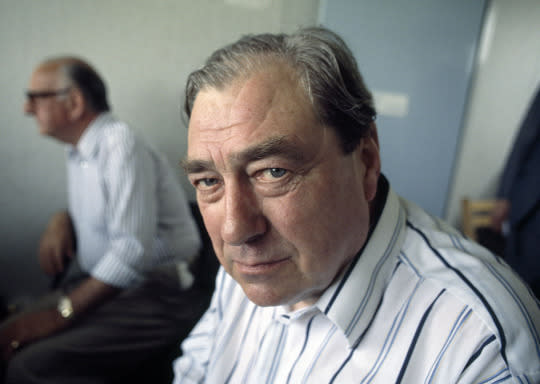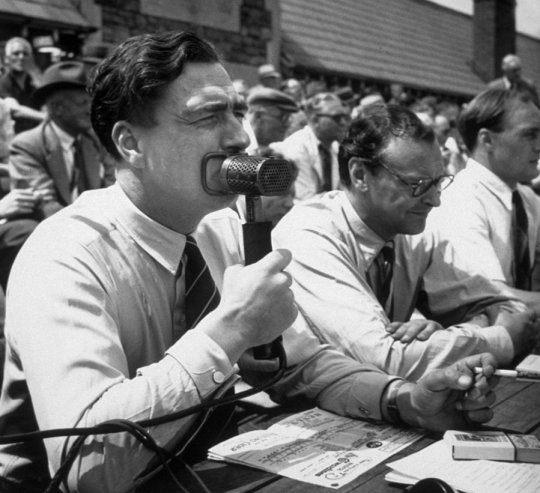yahoonick
In our weekly series, Yahoo Sport’s Nick Metcalfe features a famous voice of sport. With England’s Test series in India under way, the great cricket commentator John Arlott is the latest to go under the spotlight.

John Arlott was quite simply broadcasting royalty, and will always occupy a very special place in the history of cricket commentary.
A voice of great authority and gravitas, he became familiar to millions of cricket fans over many decades. And in some ways, the commentary box has never quite been the same since he left it.
Arlott was fascinated by cricket all his life, watching the game from a very young age. His love of the sport was cemented by some of those early experiences, including watching England play old rivals Australia at The Oval in 1926.
His initial years of work were not spent in broadcasting, but as a records clerk and then a policeman. In his spare time, he played cricket at club level and followed his beloved Hampshire home and away. On one memorable occasion, they were short of a 12th man for a match at Worcester and Arlott spent some time in the field.
As World War Two came to an end, Arlott was invited to make a public radio address to George VI on VE Day, which attracted the attention of the BBC. It was also noticed by poet John Betjeman, who became his mentor. How typical of Arlott’s true star quality.
He joined the BBC as a poetry producer for the World Service. It wasn’t long before he was asked to commentate on cricket and he described India’s warm-up games during their 1946 tour of England.
Arlott was brilliant from the start, and soon began to commentate on Test matches. Despite some initial clashes with another famous cricketing figure, EW Swanton, he soon became an accepted part of the BBC team.
To say it was the start of a long run for Arlott would be an understatement in the extreme. He actually covered ever home Test for England from 1946 to 1980. He did occasionally go on tour in those early years - to South Africa in 1948–1949 and Australia in 1954–1955 - but his dislike of the heat meant he generally avoided them.
All sport on the radio is special, but I’ve always believed certain games lend themselves so perfectly to that most intimate of mediums.
Cricket is perhaps top of that list. Listening to the sport on the radio remains one of life’s simple, but very happy pleasures. And for decades, there was one true constant for fans everywhere. Arlott. Such was his status that he became one of the most famous people to be associated with the sport.
One of the most celebrated programmes in radio history, Test Match Special, began in 1957, initially broadcast on the medium wave service of the BBC Third Programme and for many years later on Radio 3. It was the first time that matches were covered uninterrupted, with ball-by-ball commentary, and it meant even more of Arlott on the airwaves.
One of the lovely features of Test Match Special is that it hasn’t always just attracted cricket fans. Many others have found the programme a great comfort and regularly tuned in, despite not really understanding the sport. Indeed, such was the power and reach of TMS, Arlott probably became one of the most significant voices in all of radio.
In more recent times, humour has become one one of the central features of TMS, but it was more serious in the early days. That seemed to suit Arlott. With him, the game was always first and last, his everything. That wonderful rumbling burr lent itself so perfectly to the rhythms of cricket. His diction was precise, his voice distinctive. In fact, I think it’s fair to say there’s never been one quite like it in broadcasting.
Arlott was also a great wordsmith, with a poetic style. It was once written in the cricket bible Wisden: “His commentary technique was strongly influenced by his poetic sense. With the economy of a poet he could describe a piece of play without fuss or over-elaboration, being always conscious of its rhythm and mindful of its background. He was never repetitive or monotonous, except for effect. The listener’s imagination was given free rein.”

That’s part of the magic of radio of course – we can paint our own pictures. Arlott knew that all too well. From first to last, a memorable line from him was never far away.
When South African spinner Tufty Mann had England batsman George Mann in all sorts of difficulties in 1947, Arlott described it as: “A case of man’s inhumanity to man.”
When a streaker ran onto the pitch during an Ashes Test in 1975, Arlott said: “We have got a freaker (correct spelling) down the wicket now. Not very shapely and it is masculine, and I would think it has seen the last of his cricket for the day. He is being embraced by a blond policeman and this may well be his last public appearance. But what a splendid one.”
During the first World Cup final between Australia and West Indies in 1975, a shot from the great Clive Lloyd was described as “the stroke of a man knocking a thistle top off with a walking stick”.
And on a rare trip abroad, to Australia for the Centenary Test against England in 1977, Arlott was commentating on the great fast bowler Dennis Lillee when he produced another poetic gem.
“Lillee setting a field of immense hostility. The crowd with sun and beer doing their work, appealing for quite significant non-events. Seagulls on the top of the stands as vultures recruited for Lillee.”
Arlott also worked in written journalism for decades. He began with the Evening News in 1950 and later worked with the News Chronicle, before he started to report on football matches for the Observer.
Rather remarkably, he was due to cover a European Cup match between Red Star Belgrade and Manchester United in 1958. But at the last minute, chief football correspondent Donny Davies pulled rank and went instead.
On the way home from the match, a plane carrying the United team crashed. Journalists that had covered the match were also on board. The Munich Air Disaster resulted in 23 people being killed, including Davies.
Arlott, who covered the final match played by Matt Busby’s Babes in England, a 5-4 win against Arsenal at Highbury, was told the news in London and wrote an obituary for Daves.
Arlott continued to cover the national sport throughout the winter months, but stopped in the 1970s after becoming involved in violent incidents with hooligan fans.
He also wrote at length about his beloved cricket of course. He was chief cricket correspondent of The Guardian from 1968 to 1980. But there was so much more to Arlott than broadcasting and writing. In fact, he’s possibly the most layered and rounded character I’ve written about in this series.
He was instrumental in bringing Basil D'Oliveira - who was ineligible to play first-class cricket in apartheid South Africa - to England, initially to play in the Central Lancashire League. D'Oliveira later played 44 Tests for England.
Arlott always had a keen interest in politics, and stood as the Liberal candidate for Epping in two General Elections, 1955 and 1959. He became a good friend and mentor to a young Ian Botham. And he developed such a keen interest and expertise in wines that he wrote his own newspaper column and two books on the subject.

Sadly, Arlott also suffered more than his fair share of tragedy. The most devastating blow for him came on New Year’s Eve 1965, when his eldest son Jim was killed in a road accident, in a sports car which Arlott had helped him acquire. On every day for the rest of his life, Arlott wore a black tie. He also lost his beloved second wife Valerie, who died at the age of 44 in 1976.
Radio remained the bedrock of Arlott’s working life. As the years went on, TMS became more a more colourful programme, particularly when Brian Johnston came on board with his own special brand of humour, which was sometimes of the schoolboy variety. But Arlott never changed. He was the voice of calm, reason and good sense.
It was truly the end of an era in 1980, when Arlott commentated for the final time. His last international match was the Centenary Test between England and Australia at Lord’s. There was no fanfare from Arlott, quite the opposite. His final words were wonderfully understated.
“That’s the end of the over, it’s 69 for 2. And after Trevor Bailey, it will be Christopher Martin-Jenkins.”
Cricket came first, you see. But the crowd wouldn’t let the moment pass. A public address announcement after the following over told spectators that Arlott had completed his final stint of commentary.
Fans around the ground at the home of cricket, along with the entire Australian team and England batsmen, gave Arlott a standing ovation. When he later came out to the Lord’s balcony to present the man of the match award, further applause from the crowd lasted several minutes.
It was later reported that TMS colleague Tony Lewis said to Arlott: “Not a very romantic last word, John.” Arlott swiftly replied: “There’s nothing remotely more romantic than a complete and forever clean break.”
A few days later, Arlott was back at Lord’s for his final ever commentary, the 1980 Gillette Cup final between Middlesex and Surrey.
Arlott spent his later years on Alderney in the Channel Islands. But his health was fragile, and he died in 1991 at the age of 77.
Johnston paid a glowing tribute, saying: “He spread the gospel about cricket around the world more than anyone else.” A week after he died, Botham - who had a holiday cottage in the Channel Islands - cracked open a bottle of John’s favourite wine at his graveside.
It was a storybook life to the end. It’s hard to believe the best part of four decades have now passed since Arlott uttered his final words on radio.
There have been so many wonderful voices of cricket, many of whom I’ve already written about in this series, like Richie Benaud, Martin-Jenkins and Johnston. But Arlott remains in a particular class of his own. He really was an outstanding broadcaster. And a truly great friend of our summer game.

